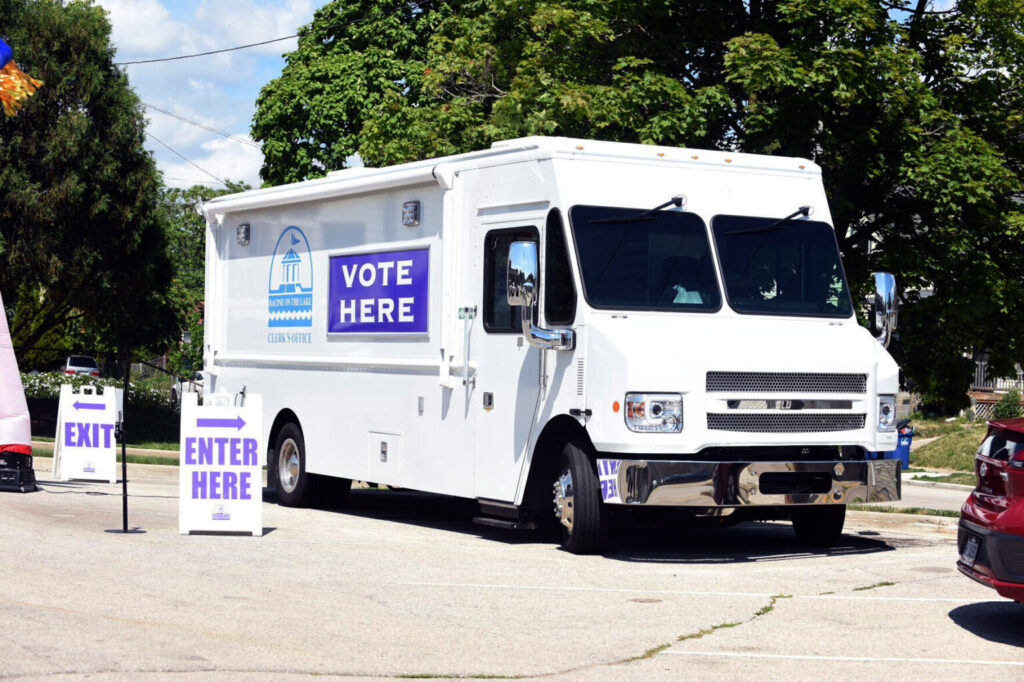Wisconsin Supreme Court Preserves Municipal Control Over Early Absentee Voting Sites

In a 4-3 ruling, the Wisconsin Supreme Court dismissed a right-wing legal challenge that sought to limit the authority of municipalities to designate early absentee voting locations and prevent future use of a mobile voting van deployed by the city of Racine during the 2022 election cycle.
The majority opinion — from which all of the court’s conservative justices dissented — did not address the merits of the case, instead concluding that the individual plaintiff who sought judicial review lacked standing.
Tuesday’s decision stems from a 2022 lawsuit from the conservative Wisconsin Institute for Law & Liberty (WILL), which not only sought to prohibit Racine from using a mobile van to conduct in-person absentee voting, but also aimed to restrict the city’s designation of in-person absentee voting sites more broadly. In Wisconsin, such sites allow individuals to request, vote and return their absentee ballots prior to Election Day.
WILL filed the case on behalf of a Racine voter, Kenneth Brown, after unsuccessfully bringing an administrative complaint over the same absentee voting issues before the Wisconsin Elections Commission — the state’s bipartisan election administration agency — in August 2022.
“Brown has failed to demonstrate that WEC’s decision caused him any such injury. As a result, Brown does not have standing, and his complaint must be dismissed,” today’s decision reads.
In a January 2024 ruling, a Wisconsin trial court judge partially sided with WILL, concluding that the city’s geographical distribution of early voting sites during the 2022 primary election unlawfully afforded an advantage to Democratic voters.
While the judge additionally deemed the use of the city’s election van unlawful, he rejected one of WILL’s arguments to further curtail early voting — namely that in-person absentee ballot sites should be located as near as possible to the office of the municipal clerk or board of election commissioners.
Following the trial court’s decision, multiple parties to the case — including the Wisconsin Elections Commission, Black Leaders Organizing for Communities (BLOC) and the Democratic National Committee — asked the Wisconsin Supreme Court to review the matter, which it agreed to do in a May 2024 order.
Prior to holding oral argument, the court’s liberal majority paused a portion of the trial court’s order ahead of the state’s 2024 elections that would have banned municipalities from operating early voting sites in a manner that may have conferred a partisan advantage. The justices noted that leaving the trial court’s partisan advantage standard in place could create confusion and uncertainty for both voters and election officials by drastically reducing the availability of early voting sites.
At oral argument last September, BLOC expressed concerns about how severely limiting the number of available early voting locations throughout the state would disproportionately affect voters of color, who predominately reside in Wisconsin’s cities.
Other parties on the pro-voting side argued that requiring in-person absentee voting sites to be situated as closely as possible to a municipal clerk’s office would effectively require the state to revert back to a defunct provision of Wisconsin law that only allowed for one alternate in-person absentee site per municipality.
Meanwhile, WILL contended that Racine’s “scattering” of absentee voting sites throughout different areas outside of where the municipal clerk’s office is located “was what conferred partisan advantage” to Democrats during the 2022 primary election.
With today’s ruling, Wisconsin voters will continue to have access to early absentee voting sites in future elections. However, given the decision did not address the merits of Brown’s arguments, the door still remains open for future right-wing legal challenges to this election matter.
The next Wisconsin election will take place April 1, when voters will head to the polls to decide a high-profile state Supreme Court race that will determine ideological control of the bench. Liberal Dane County Circuit Court Judge Susan Crawford and conservative Waukesha County Circuit Court Judge Brad Schimel are vying for a seat that will be vacated by liberal Justice Ann Walsh Bradley.